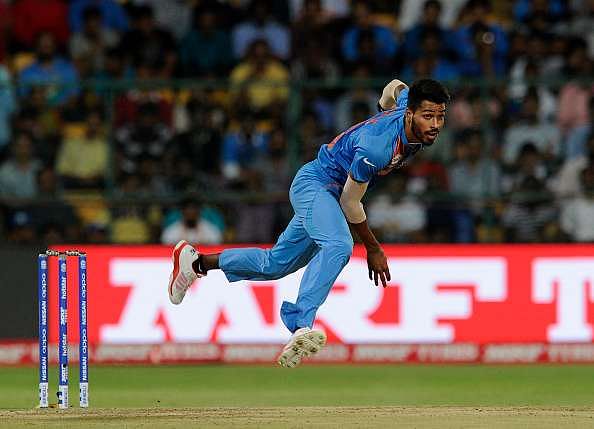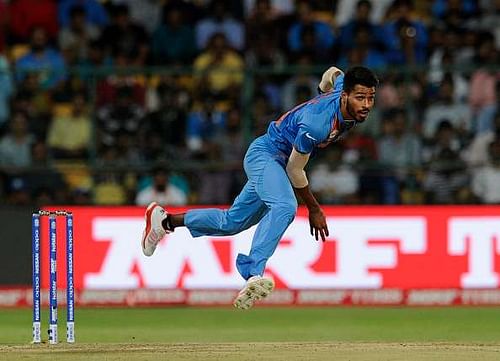
Bowling out Ashwin early wasn't a mistake on Dhoni's part; it was a necessity

A lot has been said about India's miraculous victory over Bangladesh, and not all of it has been positive. But while there's no denying the luck that MS Dhoni and his men had towards the end, it's not fair to blame the team or Dhoni's captaincy for the close shave, as some journalists have been doing.
Yes, it was a gamble to give Hardik Pandya the last over. But Dhoni has taken such gambles before, most famously in the final of the 2007 World T20 where Joginder Sharma became immortal for his last-over heroics.
Inexperienced bowlers at the death: madness or masterstroke?
Yesterday, Jasprit Bumrah bowled the 19th over, and Pandya bowled the 20th. On the surface it would appear that this was a huge mistake; both Bumrah and Pandya are highly inexperienced, and have rarely faced the kind of high pressure situation they were in yesterday.
Bumrah at least has a reputation of being accurate with his deadly yorkers, and he didn't disappoint in that regard. But Pandya is not known for his great bowling at the death, and is not very pacy either.
But if you think about it, did Dhoni really have any other choice? What most people don't understand is that in a low-scoring chase, a lot of conventional strategies are thrown out of the window. Keeping your best bowlers for the end sounds like a very easy thing to do in theory, but in practice it's not always possible to do that.
When you have a small score like 146 to defend, you want to ensure that the game never gets away from you at any stage. In the middle overs, Bangladesh were cruising along and the likes of Suresh Raina or Yuvraj Singh couldn't have been expected to stem the flow of runs or make a breakthrough.
It was vital to get the wicket of Shakib Al Hasan, and it was also vital to keep the required run rate sufficiently high. In such a scenario, you can't shy away from bringing back your best bowler; you know that any delay in his arrival could mean that the game has already slipped out of your grasp.
As it turned out, Ashwin's return yielded immediate results, in the form of Shakib's wicket. He gave away just one run in that over, and suddenly Bangladesh were under a bit of pressure.
Dhoni then had to bowl Nehra soon too, or else the pressure would've been released. Again, with a small total to defend, maintaining the pressure on the batsmen is of paramount importance.
So bowling out Ashwin and Nehra wasn't exactly a mistake on Dhoni's part. Similarly, giving Pandya the last over wasn't a masterstroke, but a gamble born out of necessity. On paper it may seem that Dhoni's captaincy decisions were a bit odd in this match, but in reality that wasn't the case at all.
India's luck, and Bangladesh's disappointing play
Was it Pandya's nerves that won India the match, or Dhoni's genius? It was a bit of both in my opinion, but a large part of it also had to do with Dhoni's luck - or in other words, Bangladesh's poor cricket.
Any batsman playing any level of cricket anywhere in the world will know that with two runs needed off three balls, the most important thing to do is take a single and ensure your team's safety. But sadly for Bangladesh, two of their most experienced batsmen didn't realize that.
Both Mushfiqur Rahim and Mahmudullah should have looked to take the single and level the scores, but they both went for the fancy shot. The midwicket fielder was placed deep too; if Mushfiqur had just tapped the ball in that direction, a single was guaranteed.
They should have tried to play like Rahul Dravid, but they went instead for the Dhoni-style finish. And that cost them big time.
Bangladesh would be kicking themselves for their mistakes; this is a loss that they won't forget for a long time. They all nurtured the dream of defeating India in India, and they came so close to achieving it. But they snatched defeat from the jaws of victory at the last minute, and they only have themselves to blame.
That said, Dhoni does deserve some of the credit for keeping cool till the very end. The decision to take place the fielders in the right places, the advice to Pandya to bowl short of a length, the move to take off his gloves on the last ball and run towards the stumps – all those things are the hallmarks of an experienced captain.
After Pandya gave those two boundaries in the first three balls, you could see the pressure written all over his face. But Dhoni continued to back him and give him encouragement, and that proved decisive in the end.
Batting remains a worry – what will Dhoni do to address it?
India have two wins out of three matches in the 2016 World T20, but I'm sure Dhoni is not happy with the team's performance at all. Funnily enough though, this time it's the batting rather than the bowling that is the cause of concern.
The bowling, contrary to historical precedent, has actually been outstanding. All the traditional complaints about India's bowlers - they can't bowl yorkers, they can't bowl at the death, they can't take quick wickets - have been rendered invalid.
Nehra and Bumrah have been very good with their line and length, and the support bowlers have been handy too. But Ashwin has been the biggest difference-maker; 'The Ring Leader' has broken partnerships at will and has also been economical.
Ashwin has actually turned into the kind of bowler whom no batsman wants to attack. All teams look to play him out and get around 20-odd runs from his overs, without giving him any wicket opportunities. But the great bowler that Ashwin is, he has still managed to get wickets.
If you remember, Shakib wasn't trying to attack Ashwin when he edged to slip. He was playing a forward defensive shot, and even then he couldn't keep the danger out. That's how good Ashwin has become – even when batsmen are looking to just play him out, he can still run circles around them.
Even India's fielding this tournament has been very good. Yes there were a few dropped catches yesterday, but the ground fielding was very effective. Ravindra Jadeja and Rohit Sharma were fantastic with their saves, and many of the Bangladeshi players' shots would've gone for boundaries if not for the athletic prowess of India's fielders.
The batting, however, is a completely different story. The top order has underperformed for three matches in a row now, and even the middle order is looking suspect. Shikhar Dhawan, Suresh Raina, Rohit Sharma and Yuvraj Singh have all struggled, and Dhoni himself hasn't looked in the best of nick.
There are a couple of obvious reasons for the tentativeness of the batsmen. One reason is that they are all under some kind of individual burden.
Dhawan's place is under threat, and he has developed a habit of scoring a 50 every fourth or fifth innings, which ensures that he remains in the team. Yuvraj is making a comeback into the team, and isn't playing as freely as he used to. And Raina has been going through a lean patch; even though he made 30-odd yesterday, he hasn't looked fluent.
The other reason is that with India playing at home and having entered the tournament as overwhelming favourites, there is tremendous pressure on all the players to perform to their best. That has made them over-cautious, which has also led to rash strokes.
But there may be another subtle malaise behind these failures. Have the Indian batsmen lost the art of playing on slow pitches with uneven bounce? All of them performed exceedingly well in Australia, where the bounce was true and there was little lateral deviation. They also scored big against Sri Lanka and in the Asia Cup, where the conditions were pretty docile for batsmen. But now that they have been confronted with tricky pitches, they have been found wanting.
Dhoni will probably address the next team meeting with a very firm hand. It's time for the batsmen to start performing; this is it. India can't afford to keep failing with the bat, or else it will be curtains.
As for the problem of the batsmen's technique to deal with tricky pitches, Dhoni will probably not look to address that right now, since the team is still winning. But in the long run, that is definitely something that will give him sleepless nights, and it is up to his genius to find a solution to it.